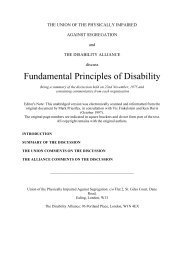Global-Report-Living-Colour-dr2-2
Global-Report-Living-Colour-dr2-2
Global-Report-Living-Colour-dr2-2
You also want an ePaper? Increase the reach of your titles
YUMPU automatically turns print PDFs into web optimized ePapers that Google loves.
24<br />
Inclusive Communities = Stronger Communities<br />
GLOBAL REPORT ON ARTICLE 19: THE RIGHT TO LIVE AND BE INCLUDED IN THE COMMUNITY<br />
enables inclusion and participation. For people with<br />
intellectual disabilities, while some specific<br />
accommodations are necessary and may improve access to<br />
the community, there is no service or support that will<br />
enable full inclusion. It is not sufficient to provide a child<br />
with an intellectual disabilities with physical access to a<br />
classroom nor is it sufficient to give them a teacher’s<br />
assistant. Real inclusion requires a reorganization of the<br />
classroom, curriculum and teaching strategies. Similarly,<br />
real inclusion in the community requires the<br />
transformation of communities; education systems, labour<br />
market, political systems, transportation systems, etc.<br />
For people with sensory or physical<br />
disabilities there has been a strong push for<br />
“Independence”. The Independent <strong>Living</strong><br />
movement has emphasized the individual’s<br />
right to live independently and to<br />
determine for themselves the life they want<br />
to live. Article 19 refers to the right to live<br />
“independently” and be included in the<br />
community. However the word<br />
independent is often misused to mean<br />
alone or without support and for people<br />
with intellectual disabilities and their<br />
families it can create a barrier to inclusion. If<br />
a person cannot live “independently” then<br />
they are considered not capable of living<br />
and participating in the community. In order to live<br />
“independently” people with intellectual disabilities need<br />
support and need to have relationships with their families<br />
and others who enable them to live and be included in the<br />
community.<br />
Although Inclusion International’s name, our mission<br />
statement, and the CRPD all mention inclusion, it is in<br />
many ways a concept that is not well understood. In our<br />
mission statement we make it clear that inclusion is<br />
different from supports and services. Supports and



